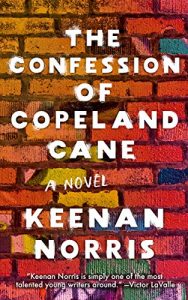Ian Mond Reviews The Confession of Copeland Cane by Keenan Norris

The Confession of Copeland Cane, Keenan Norris (The Unnamed Press 978-1-951-21325-1, $28.00, 288pp, hc) June 2021.
The Confessions of Copeland Cane poses the question: when is a dystopia not a dystopia? The answer: when there’s no notable difference to a person’s lived experience. The America Cope describes is clearly one sliding at break-neck speed toward a fascist police state with a pervasive, all-seeing propaganda machine masquerading as a media conglomerate. The only population we see subjugated in this novel are Black people, in much the same way they are oppressed now. A striking example is ‘‘ghetto flu,’’ a descendant of COVID that continues to sweep through low-income Black communities, like East Oakland, with a higher mortality rate. Then there’s gentrification, the 21st-century version of red-lining, which sees Black folk, such as the residents of the Rockwood high-rise, kicked out of their homes to make space for gated, predominantly white, neighbourhoods. While Cope is afforded the privilege of attending an elite school, it’s only because his hard-luck story coupled with the colour of his skin will look good on Piedmontagne’s brochures.
But standing above all this, of course, is police brutality. We’re told that post the *8:46 protests (a reference to the length of time Derek Chauvin knelt on George Floyd’s neck), police and private security were no longer mandated to wear body cams. But as Cope points out, this change to laws is just another example of Black people ‘‘gettin’ fucked with by po-lice’’:
They spoke after Tulsa in 1921. They spoke after Harlem in ’43. They spoke after Watts in ’65. They spoke after Rodney King. They spoke after Sean Bell and Oscar Grant and all them folks who was killed ’fore I was born. And then*8:46 happened. I’m old enough to remember it happening and things changing and how it had aye’body and they momma thinkin’ this at last would be when the po-lice would get defunded and killer cops would be sent to jail and this, that, and the third, fourth, and fifth was ’bout to change for once, for all, and forever…. But what actually happened?…. How many of these out and out Ku Klux Klan members been stripped of they badges, fired from they jobs, and had the cuffs clapped on them? What’s actually changed when it comes to the po-lice that ain’t get flipped back around and made even worse?
It’s a long quote, I know, but with a book as extraordinary as The Confessions of Copeland Cane, a novel that illustrates that for Black people the dystopia of the future is no different to the dystopia of now, it’s important for the reviewer to get out of the way and let the novel speak for itself.
This review and more like it in the September 2021 issue of Locus.
 While you are here, please take a moment to support Locus with a one-time or recurring donation. We rely on reader donations to keep the magazine and site going, and would like to keep the site paywall free, but WE NEED YOUR FINANCIAL SUPPORT to continue quality coverage of the science fiction and fantasy field.
While you are here, please take a moment to support Locus with a one-time or recurring donation. We rely on reader donations to keep the magazine and site going, and would like to keep the site paywall free, but WE NEED YOUR FINANCIAL SUPPORT to continue quality coverage of the science fiction and fantasy field.
©Locus Magazine. Copyrighted material may not be republished without permission of LSFF.







